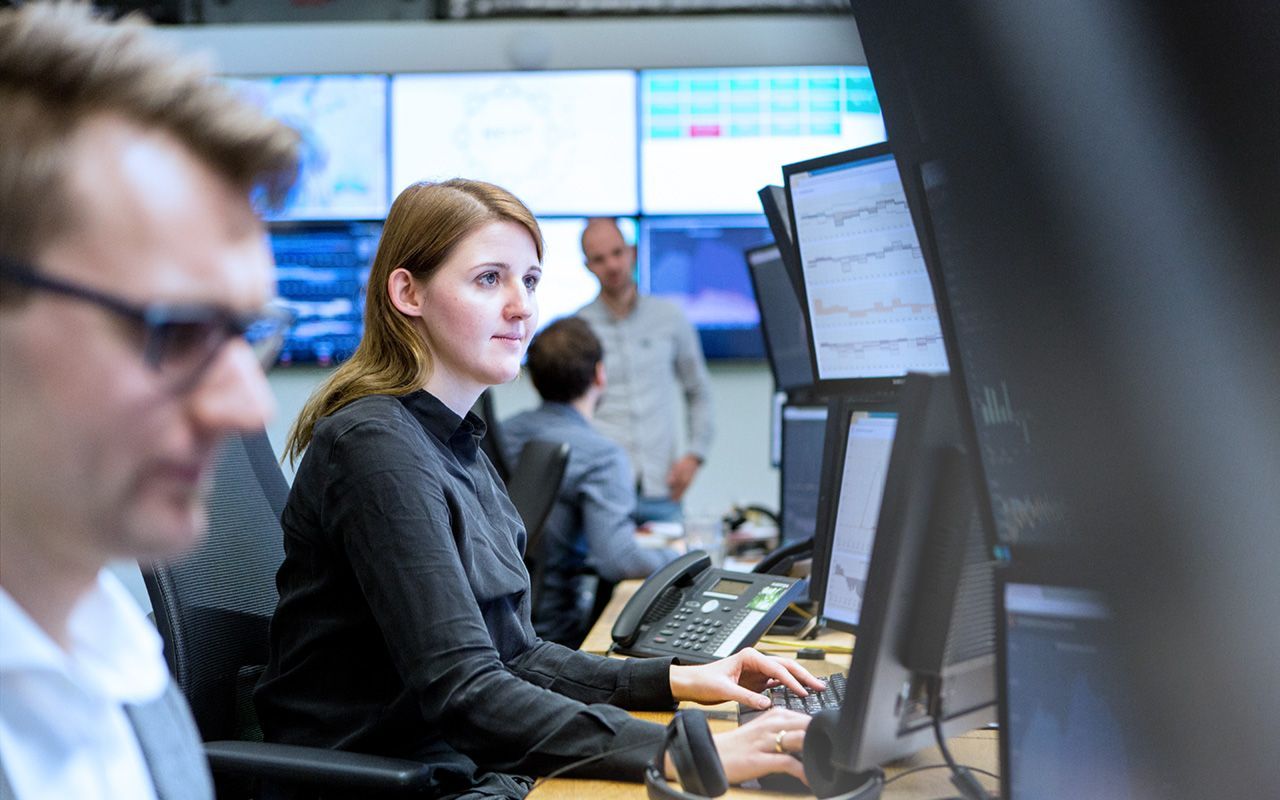Trading for the Energy Transition – Insights into the Job of an Energy Trader
Visitors entering the trading floor of Next Kraftwerke perceive much more monitors than people. At least four, sometimes eight monitors are grouped around each workplace. Traders watch the activities on the screens with full concentration: energy market prices, load and generation profiles, market information, weather reports, and plant schedules. The job is to keep an eye on, prioritize and evaluate a wide range of information. The acquired knowledge largely determines the traders' activities on the European power exchanges.

Julia Schleper is one of the energy traders at Next Kraftwerke and has been working in the team for ten years. Her focus lies on short-term power trading: "For me, the power exchanges EPEX SPOT, based in Paris, and Nordpool in Oslo are particularly important. This is where power quantities are sold and bought at short-term in day-ahead and intraday trading," Julia explains.
Day-Ahead and Intraday Trading Structure the Workday
The daily routine and work steps in electricity trading are largely determined by the schedule of day-ahead and intraday trading. For the day-ahead market, the quantities and prices at which traders want to trade electricity on the exchange for the following day must be defined by noon. During the morning meeting, the team talks about various factors that could affect pricing. The main question is: "Has anything fundamentally changed from the previous day's data that could influence the market?" As a trader in renewable energies, Next Kraftwerke trades much electricity from photovoltaic and wind power plants. It is therefore highly important that the weather forecasts are reliable and that a meteorologist attends the daily meeting via video conference. The team compares the forecasts of the transmission system operators (TSO) with various sources and weather models. In particular, they assess risks for deviations from the forecasted PV and wind feed-in.
“Our own analyses and the information we get from our weather call influence our day-ahead trading. At noon, we deliver our quantities and the prices at which we want to sell our electricity to the power exchange," explains Julia. The exchange matches the quantities and prices and about an hour later, Julia learns what prices were realized for her bids. The schedule is then sent to the TSOs. The schedules provide information on how much power the plants managed by Next Kraftwerke will feed into the grid at what hour of the next day.
Power Trading at 15-minute Intervals
Intraday trading for the next day starts at 3 p.m. and power trading picks up speed once again. In contrast to day-ahead trading, electricity on the intraday market can additionally be bought or sold every 15 minutes. This poses a challenge for energy traders: They now have to keep abreast of all sudden developments that could have a direct impact on the market and prices. The team checks load data, electricity consumption, price overviews, information about regional feed-in and, of course, live data from the networked plants. Analytical skills are now as much important to the job as the ability to recognize regularities and patterns from a multitude of data and sources in order to draw conclusions and make decisions. "The situation is not always absolutely clear in this process. That's why we have to be able to make decisions even if the current situation is riddled with uncertainty. You can also be wrong with your decisions, but the tide usually turns again the next day," says Julia.
Outage reports, for example, inform about where power plants or interconnectors are currently down. "If such a cross-border interconnector between countries fails, no power can be shifted back and forth between the affected countries. This has an immediate impact on liquidity and energy prices in the countries involved," explains Julia, whose job description it is to trade electricity for France, the Netherlands and Belgium.
Reliable weather forecasts play an important role in intraday activities, too. "Our forecasts are very good, but of course unexpected weather conditions can occur in some regions during the day. We are then challenged to anticipate the last thundercloud and act accordingly," says Julia. But not every phenomenon can be predicted: "No one had the impact of Saharan dust on their radar years ago. Everyone wondered why PV feed-in was so low despite the nice weather," the energy trader reports.
The Basic Story as a Guideline for Energy Trading Activities
A little screenplay for energy trading, that's how you can imagine the basic story: Julia searches a variety of data sources for the most important key drivers. She uses them to develop a kind of basic story that determines her actions on the power exchange and helps her to find the fair market price. “Currently, the biggest influencing factors and thus the basic story have been determined: we have a lot of sun and heat and, due to the Ukraine war, an energy shortage,” Julia explains. Changes in the forecast immediately lead to large price effects. As a result, Next Kraftwerke and other traders have to react quickly. For Julia, it is now important to be faster than the competition in order to achieve the best price.
Currently the market situation is particularly challenging for traders: during prolonged periods of heat, the likelihood increases that nuclear power plants will have to be throttled or even shut down. This can have two reasons: Firstly, there is no longer enough cooling water due to falling river levels. Secondly, nuclear plants are not allowed to discharge cooling water back into the rivers to prevent them from heating up even more. “In this case, we have to monitor the market particularly well in order to be able to respond to unexpected needs of the grid operator. In this way, we support the stability of the electricity grid,” Julia explains her job.
More to read
One Goal of a Trading Job: More Security of Supply
Intraday trading is not only about profitable revenues, power trading also has positive effects on grid stability and thus on security of supply. Electricity traders are able to recognize systemic errors and can react at short notice. If, for example, forecast errors occur, they ensure that the error is compensated for in intraday trading. Since electricity can be bought or sold at short-term intervals of 15 minutes, traders can react very quickly to changes - such as changing weather conditions and feed-in forecasts – by initiating appropriate trading activities. Therefore, the trader’s job has an impact on the power grid. "As short term traders, we are very important for maintaining grid stability. Our transactions help to avoid the use of expensive balancing energy," Julia explains. In addition, intraday trading smooths out Next Kraftwerke's balancing group. For example, if shortfalls or surpluses occur on the day itself that could not be anticipated in day-ahead trading, these are balanced out in intraday trading by buying or selling electricity quantities. The balancing group is smoothed out. In this way, the trading team reduces the balancing energy costs. Because for every deviation between forecast and feed-in that still exists after intraday trading, balancing energy costs are charged. These costs can sometimes be considerable.
Julia has never regretted her career choice: "Short-term trading on the spot market is more than just an exciting job for me - we are actively working on the energy transition. We help to ensure that renewable energy plants produce on demand and in a market-oriented way and that a sustainable electricity system can function."
More information and services



